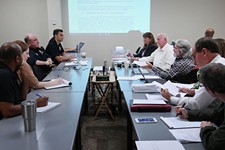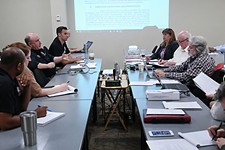Hired / Fire
Overtime, wages, hiring procedures at heart of negotiations between city, firefighters
By Nina Hernandez, Fri., Aug. 11, 2017
The city of Austin and Austin Firefighters Association resumed contract negotiations this week as City Council continues to keep a watchful eye on the Fire Department's overtime pay situation. Before a bargaining session held Wednesday, Aug. 9, Austin Fire Chief Rhoda Mae Kerr briefed Council on what the department has done to minimize those costs. After witnessing a pointed exchange between Kerr and Council Member Alison Alter, AFA representatives continued on to the city's Rutherford campus, and promptly began butting heads with city labor negotiators over the contract's hiring article.
Kerr went before Council to detail the ways in which the department can essentially shuffle around existing staff to decrease the amount of overtime costs. For fiscal year 2017-2018, the department is prepared to reduce the ratio of team leaders to cadets in its classes, and to reassign certain sworn personnel back to operations. The last component of the plan is the hiring of a robust cadet class, which the U.S. Department of Justice will allow. (The DOJ gave the department more hiring flexibility on Aug. 2.)
Though much of Council praised Kerr's work, Alter sharply questioned whether it was good management practice to pull sworn personnel – who generally make more money than those in operations – to fill in those overtime needs, which she noted are partly driven by the department's policy of four-person staffing. For safety reasons, the department ensures each crew consists of four members.
Alter then raised the possibility of the department moving to a mandatory added overtime model – meaning the department couldn't take employees with higher overtime costs over those with lower ones. "That is a management choice where you could preserve four-person staffing, which I hear is very important to you," said Alter, "and make some different choices without having to move people out of staff positions that are relevant."
Chief of Staff Tom Dodds said the department has in the past steered away from forcing its firefighters to work overtime. He said executive staff has explored the possibility internally before, and could do so again at Council's discretion. Going from a voluntary overtime policy to one that's mandatory is "a huge cultural shift," he said, and "there is potentially money savings, absolutely, but we've thought the trade-off between the number of staff that are signing up and the amount of money we would save is not worth the angst it would cause internally to our organization."
Council Member Delia Garza, herself a former firefighter, responded to Alter's implication that four-person staffing is something that is only important to AFD personnel, saying that it should be important to the entire Council as a public safety issue. In response to Alter's questions about funding for additional fire stations, Garza hinted she would bring up this topic the next time the city's pool system – an Alter budget priority – was up for discussion. "There are parts of the city that have to wait 11 to 12 minutes for a call," said Garza. If a loved one is in cardiac distress, she hypothesized, you want help to arrive sooner.
The Fire contingent left that briefing and went back to the bargaining table. Before discussing their wage proposal, which asks the city to take into account Austin's increasing cost of living, AFA President Bob Nicks reiterated his proposal that the city agree to a slate of concessions in exchange for a change in vacation policy that could save the city $1 million. Nicks hoped such a bargain could be a win-win, but so far the city has flatly denied it. The reminder did expose the undercurrent of tension coloring the proceedings. As Nicks detailed each item and why the AFA wanted them, Lowell Denton, the city's representative, interjected.
"We can do exactly that if you give us the [hiring] article that we asked for," he said. "Why is that? Why can't you just let us do it our way? And let's bargain with all the things your employees get, instead of bargaining over the way we hire."
The Austin Police Association negotiated away the hiring process to the city over a decade ago. The AFA still holds that authority, and it's unclear whether it will ever feel comfortable relinquishing it. Nicks told the city side that even in the worst-case scenario of impasse, the AFA would still be committed to working out a hiring process that truly works. "Even if the worst-case scenario occurs, we want to continue to work on hiring, and we want to make sure we have a good process going forward," he said.
On the issues of wages and cost of living, the air was more conciliatory. Nicks explained that using base pay to compare the pay of Austin firefighters to those in other cities could be misleading. There are several factors, such as pension, health insurance, and longevity pay, that function as compensation but don't necessarily add up to a specific dollar amount. In San Antonio, for instance, the city pays its firefighters $11,500 per year in longevity, compared to $2,500 per year in Austin. Based on the AFA's math, Austin firefighters are actually due a $4,337 raise.
The city asked for more information and said it would study the matter. The two sides are due back at the bargaining table on Monday, Aug. 14.
Got something to say on the subject? Send a letter to the editor.











